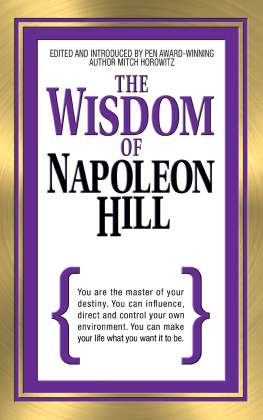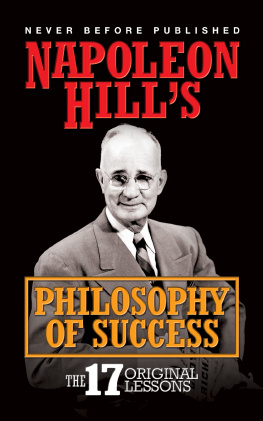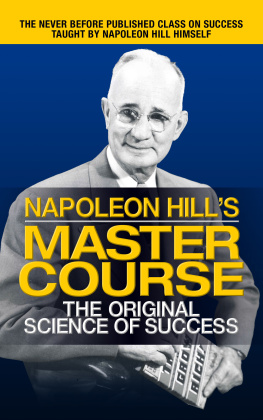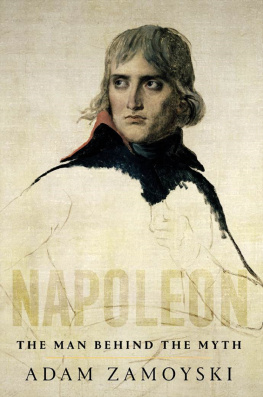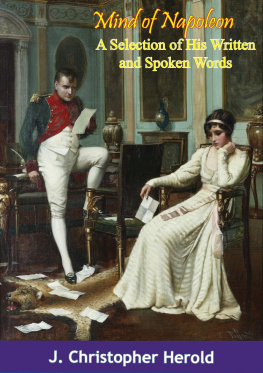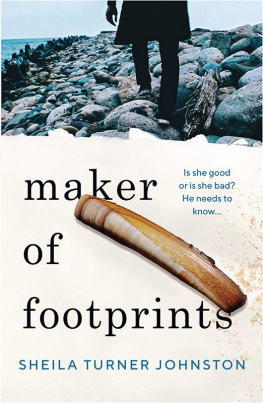I N THE W ORDS OF N APOLEON
T HE N APOLEONIC L IBRARY

Other books in the series include:
1815: THE RETURN OF NAPOLEON
Paul Britten Austin
ON THE FIELDS OF GLORY
The Battlefields of the 1815 Campaign
Andrew Uffindell and Michael Corum
LIFE IN NAPOLEONS ARMY
The Memoirs of Captain Elzar Blaze
Introduction by Philip Haythornthwaite
THE MEMOIRS OF BARON VON MFFLING
A Prussian Officer in the Napoleonic Wars
Baron von Mffling
WATERLOO LECTURES
A Study of the Campaign of 1815
Colonel Charles Chesney
WATERLOO LETTERS
A Collection of Accounts From Survivors
of the Campaign of 1815
Edited by Major-General H. T. Siborne
www.frontline-books.com/napoleoniclibrary
In the Words of Napoleon
A Greenhill Book
First published in 2002 by Greenhill Books, Lionel Leventhal Limited
www.greenhillbooks.com
Published in 2015 by
Frontline Books
an imprint of Pen & Sword Books Ltd,
47 Church Street, Barnsley, S. Yorkshire, S70 2AS
For more information on our books, please visit
or write to us at the above address.
Copyright Lionel Leventhal Limited, 2002
New material Philip J. Haythornthwaite, 2002
ISBN: 978-1-47388-277-5
eISBN: 978-1-47388-279-9
Mobi ISBN: 978-1-47388-278-2
All rights reserved. No part of this publication may be reproduced, stored in or introduced into a retrieval system, or transmitted, in any form, or by any means (electronic, mechanical, photocopying, recording or otherwise) without the prior written permission of the publisher. Any person who does any unauthorized act in relation to this publication may be liable to criminal prosecution and civil claims for damages.
CIP data records for this title are available from the British Library
INTRODUCTION
M uch of the text in this book is composed of Napoleons own words, in so far as a translation can ever capture the full inference. Although sources are not quoted to do so, as the original compiler remarks, would require footnotes as extensive as the text itself the quotations are derived from a variety of published material, foremost and most extensive among this being Napoleons correspondence. The major part of this was collected and published upon the orders of Napoleon III from 1854 onward sometimes having been subjected to considerable editing and other such documents were published subsequently. Allied to these are the official campaign Bulletins issued at the time, which deliberately gave the events in question the particular slant or emphasis desired by Napoleon.
When considering Napoleons correspondence, one impressive factor is its sheer volume. The number of letters and documents he wrote cannot be estimated with any great accuracy: various figures have been suggested, ranging from a little over 40,000 to 70,000. If the true figure approaches the upper limit, and the period covers the twenty years when Napoleon was most active (17961815), it would represent an output of almost ten documents per day, every day, many of them of great length and considerable complexity. Given that there were days when Napoleon was otherwise occupied, the production of so much correspondence is proof that not least among Napoleons attributes was a capacity for unremitting labour. (It is interesting that this was a characteristic shared with his final military opponent, the Duke of Wellington, who was equally indefatigable and also produced a huge volume of correspondence. His maxim of always completing the business of the day in the day seems to have been followed equally by Napoleon.)
Not only is the volume of Napoleons correspondence so impressive, but also its breadth. As will be seen from this selection, it covered everything from the highest affairs of state to fatherly advice to his family, and to the minutiae of military matters. Napoleons concern for, and knowledge of, even the smallest circumstances concerning his own army was all-embracing. Frederick the Great had advised that you are never to imagine that every thing is done as long as any thing remains undone ). Few individuals, faced with the task of governing an empire as large as Napoleons, would interest themselves in the case of a draft of 100 men of the 28th Dragoons, who had been put into the field on bad horses, and with worn-out equipment and defective muskets, as did Napoleon in September 1810 (he even requested the name of the junior officer responsible, whom he ordered to be placed under arrest for a month for taking such a liberty).
One of the secrets of Napoleons all-embracing grasp of the exact state of his forces at any particular moment was the fact that he appears not to have looked upon the task as a chore, but actually enjoyed such work. In 1806, he advised his brother, Joseph, to Take pleasure, if you can, in reading your returns. The good condition of my armies is owing to me devoting to them 2 or 3 hours every day. When the monthly returns of my armies and fleets, which form 20 thick volumes, are sent to me, I give up every other occupation in order to read them in detail and to observe the difference between one monthly return and another. No young girl enjoys her novel so much as I do these returns. Even on campaign, he kept a series of carnets (notebooks) in which were recorded, in meticulous detail, all relevant facts about his own regiments and whatever was known about those of the enemy; renewed regularly, they provided him with an accurate and invaluable source of information and intelligence. This enthusiasm and ability to work tirelessly, when combined with innate ability, wide knowledge and experience, made Napoleon so formidable a commander.
To understand how Napoleon was able to cope with such a vast quantity of correspondence, it is useful to consider his methods of working. Particularly after he had assumed political power, relatively little of his correspondence was written in his own hand, perhaps fortunately, as his handwriting became notoriously illegible. Whether at one of his palaces or in his tent in the field, Napoleon customarily dictated his letters to one or more secretaries, who attempted to keep pace with his rapid thoughts. His first principal secretary, Louis-Antoine Fauvelet de Bourrienne (17691834), described the office at the Tuileries where Napoleons work was carried out. It contained two tables, one very grand and beautiful, almost in the centre of the room, and an armchair with its back to the fireplace, in which Napoleon sat. (The beautiful table, like the ornate state bed in the adjoining room, where Napoleon rarely slept, Bourrienne implied, was not really to Napoleons taste, but was kept as a means of impressing others.) Bourriennes own table was very plain and stood by a window, through which he could catch a glimpse of chestnut trees, but otherwise could not be distracted, as he had to stand up to see anyone in the gardens. It was from here or sometimes from a settee that Napoleon would dictate his correspondence. Often, he would do this on the move, striding back and forth across the room, and composing his letters in a conversational style as if he were speaking personally to the recipient. So rapid was his delivery that the secretaries found it necessary to employ a form of shorthand, or even to attempt to memorise the content, the letters being written out in full subsequently, before being presented to Napoleon for his approval and signature.










